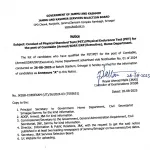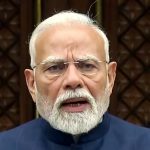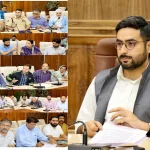Global warming, climate change and its adverse effects were relatively an unknown phenomenon just a few years back. The situation has changed intensely recently. Adverse effects of environmental destruction and its negative effects is now a growing concern at even laymen’s level. Insecurity is staring mankind on several other counts like wars, terrorism, social unrest, economic slowdowns, food production decrease etc.
Jammu Kashmir is also affected by global events and developments. Native Glaciologist Shakil Romshoo pragmatically believes that the effects of the changing weather and climate have been more than evident for at least a few decades now, more so in the last few years.
For quite some period Kashmir has recorded temperatures about 10 degrees centigrade higher than normal during harshest part of our winter – the “Chilai Kalan.” Causing significant decrease in winter snowfall and consequently unprecedented melting of glaciers during summer, he said in an interview to a media outlet.
According to Romshoo, there are 18,000 glaciers in the six mountain ranges of Jammu, Kashmir and Ladakh. Mass loss in glaciers has been observed in the glaciers of the regions and it is increasing since the last few decades, said Romshoo.
Surge in demand of commodities including basic essentials due to Population increase on one side and dwindling cultivable land, natural resources on the other side is troubling experts and governments alike.
Department of economic affairs government of India has come out recently with an appraisal of the Indian economy taking an overview of its past, present and future. Titled The Indian Economy –A Review, this paper needs to be looked at in the aforesaid background.
The review document cautions about the global economy battered by successive shocks and struggling to maintain its recovery post-Covid pandemic. It says that if blows like supply chain disruptions persist, they will impact trade flows, transportation costs, economic output and inflation worldwide.
The 13th Ministerial Conference (MC13) February 26 to March 2, 2024 of the WTO concluded in Abu Dhabi, UAE. Failure to break the Deadlock on contentious issues has raised a question mark on efficacy of WTO itself and it seems any consensus on any subject even in the future ministerial conferences are difficult if not impossible.
India including Jammu Kashmir definitely will also be impacted both in short and longer terms. Review document underlines at least three trends that will be there in the coming years.
First is the end of hyper-globalisation in manufacturing, even though de-globalisation will not happen so soon because of the enormous integration of global supply chains over the last few decades. Since alternative global supply chains will take time to emerge, pressure is mounting on transportation, logistics costs, and, hence, the final prices of products.
Recent events in the Red Sea have added to the concerns over reliance on global supply chains. In other words, paper believes that exporting one’s way to growth will not be easy.
Closely related to this challenge, says the Review paper, is the advent of Artificial Intelligence with the profound and troubling questions it poses for growth in services trade and employment since technology might remove the advantage of cost competitiveness that countries exporting digital services enjoy.
Third and arguably the most important is the energy transition challenge. Concerns over rising temperatures have led to a single-minded focus on reducing carbon emissions amidst the determination that the emission of greenhouse gases, particularly carbon, is the most significant causal factor. This has led to persistent focus to move away from fossil fuels and switch to greener energy. It is a reality that, in the short run, there is a trade-off between economic growth and energy transition. In a growth-challenged post-Covid global economy, countries can ill afford to sacrifice the former for the latter. India is walking the fine line between the two more skilfully than other nations, with installed non-fossil fuel-based power generation capacity running ahead of targets.
The Government of India under the leadership of Prime Minister Narendra Modi has prepared a road map aimed to transform the country to a developed country by 2047. He has asked for SAB KA PRAYAS in this direction.
India is in fact playing a leading role in helping the world community to have a smoother transition. The Global Biofuel Alliance for global cooperation in the realm of fuel blending and International Solar Alliance to mobilize efforts against climate change through deployment of solar energy solutions are two instant examples in this regard.
Government policies at national level are being framed in a manner that will enable the transition with comparative ease. Glimpses of these policies are evident even in the interim Budget presented recently in the Parliament and also in launch of rooftop solar scheme for free electricity – PM Surya Ghar Muft Bijli Yojana.
Finance Minister Nirmala Sitharaman in her budget speech was emphatic in terming global affairs as more complex and challenging with wars and conflicts. Globalization is being redefined with reshoring and friend-shoring, disruption and fragmentation of supply chains, and competition for critical minerals and technologies, she asserted. A new world order is emerging after the Covid pandemic, she stressed.
Delving upon vision for ‘Viksit Bharat’, she added that “Prosperous Bharat in harmony with nature, with modern infrastructure, and providing opportunities for all citizens and all regions to reach their potential” with confidence arising from strong and exemplary track record of performance and progress earning ‘Sabka Vishwas’, the next five years will be years of unprecedented development, and golden moments to realize the dream of developed India @ 2047.
We in Jammu Kashmir are also conscious of these challenges at local and global level. Jammu and Kashmir continues to be a food deficit and consumer UT. The UT mostly relies on imports to meet its food requirements and in the coming years, the situation is expected to worsen further. Jammu and Kashmir, specialists point out, has already surpassed the world in average temperature rise recorded in the last 100 years. Unusual rise in temperatures can result in lowering the overall production and further increasing the deficit in food production.
The Union government has schemes complementing the efforts for reducing postharvest losses, and improving productivity and incomes. National Solar Mission as one of the key Missions with active participation from States to promote ecological sustainable growth while addressing growing energy security challenges constitutes a major contribution by India to the global effort to meet the challenges of climate change.
Budget proposal has this scheme of Rooftop solarisation that will enable households to obtain up to 300 units free electricity every month. Besides selling the surplus to the distribution companies; charging electric vehicles; providing Entrepreneurship opportunities for a large number of vendors for supply and installation creating Employment opportunities for the youth with technical skills in manufacturing, installation and maintenance.
This is just one aspect of the emerging situation and solution there off. Others like food production, Housing, health care, education and other needs for future generations are similarly challenging. Prime Minister Narendra Modi has demonstrated successfully the ability to transform challenges into opportunity.
Jammu Kashmir or for that matter any state in India is not in a position to face these challenges in isolation. States are neither capable nor do they have expertise and resources to take remedial measures on their own. It has to be a united effort where both states and the centre are on the same page playing a complementary role to each other.
Jammu Kashmir in particular because of its location has more to gain from multi-dimensional integration with the Union. Harping on separate, special, disparate or distinctiveness will prove disastrous. It is time to pursue integration-social, economic, institutional and political with rigour. This is the only way to minimize undesirable effects of emerging threats and ensure a balanced approach to peace, prosperity and protection of the environment.
Jammu Kashmir cannot face future challenges in isolation. We are neither capable nor do we have expertise and resources to take remedial measures on our own. An integrated effort by states and the centre with a complementary strategy to tide over consequent emergency will help in the future challenges.
(Author GL Raina @Ajey Bharti is Former Member of Legislative Council of Jammu Kashmir and Spokesperson of BJP JK UT)








